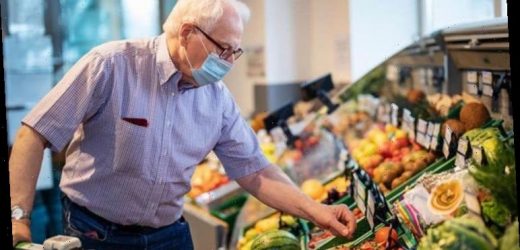Coronavirus vaccine: ’99%’ of vulnerable to get jab says expert
The coronavirus pandemic first began in March 2020 and supermarkets have seen a massive increase in their online order capacity in that time. Several safety measures have been implemented in food retailers in a bid to keep staff, customers and their families safe. But how can you shop if you are a vulnerable person?
Supermarket chains Tesco, Asda and Waitrose have become the latest to announce plans to deny entry to shoppers who wear face masks unless they are medically exempt.
The move came after Morrisons and Sainsburys declared it would implement such measures.
Retailers have been criticised for not enforcing people breaching Covid rules as the rate of infections across the country continues to rise.
The outlets will deny entry to anyone without a valid reason not to wear a mask.
We will use your email address only for sending you newsletters. Please see our Privacy Notice for details of your data protection rights.
Under the new lockdown rules, you are only permitted to leave your home for essential reasons.
These reasons include:
- Shopping for basic necessities, for you or a vulnerable person
- Working or volunteering, if you cannot reasonably do so from home
- Exercising with your household (or support bubble) or one other person, this should be limited to once per day, and you should not travel outside your local area.
- Meeting your support bubble or childcare bubble where necessary, but only if you are legally permitted to form one
- Seeking medical assistance or avoid injury, illness or risk of harm (including domestic abuse)
- Attending education or childcare – for those eligible.
- Attending communal religious worship.
- Undertaking activities related to moving house.
The Government has issued new advice for those particularly vulnerable to the risk of coronavirus during the third national lockdown.
Under the new rules, those deemed clinically extremely vulnerable are urged to stay at home at all times,
This means not attending work unless it is impossible for them to work from home and avoiding all shops and supermarkets.
Prime Minister Boris Johnson said: “If you are clinically extremely vulnerable, we are advising you to begin shielding again and you will shortly receive a letter about what this means for you.”
DON’T MISS
Vaccine clinic postcode finder: Find a Covid vaccine clinic near me [INSIGHT]
Covid vaccine: Will the Government provide vaccines 24/7? [EXPLAINER]
It’s the inconsistency from No10 which makes the public livid [COMMENT]
How to shop if you are a vulnerable person?
Technically vulnerable people are entitled to go shopping for essential goods, but anyone deemed clinically vulnerable has been advised to avoid shops and supermarkets as the risk of Covid is high to them.
Non-vulnerable customers are still being urged to shop in stores where possible to ensure online delivery slots are available to those most in need.
Every supermarket with an online grocery operation is prioritising elderly and clinically vulnerable customers.
You can also use a volunteer shopping card which enables friends, family or neighbours to shop on your behalf.
If you are unable to repay them for your groceries via a bank transfer or cash, you can buy a volunteer shopping card which they can pay with.
NHS Volunteer Responders are also on hand to help people who need essentials or prescriptions delivered to their homes.
Many local shops in your area have also launched delivery services to help those unable to leave their homes to buy essentials.
You may also be able to seek more direct help from your local community.
You can find out what help is available from Facebook, WhatsApp groups or searching for your local Mutual Aid group.
The neighbourhood hub Nextdoor is being used in a similar way, too, with users reaching out to offer help with shopping or even supporting those in self-isolation.
For those unable to use any of these methods, the following guidance has been issued to help protect vulnerable shoppers:
- Practice social distancing when outdoors with anyone outside of your household
- Wash your hands on your return home for 20 seconds and avoid touching your face while shopping
- Make your trips as infrequent as possible
- Try to rely on family, friends and neighbours to pick up supplies for you
- Always wear a face-covering inside shops.
Source: Read Full Article







